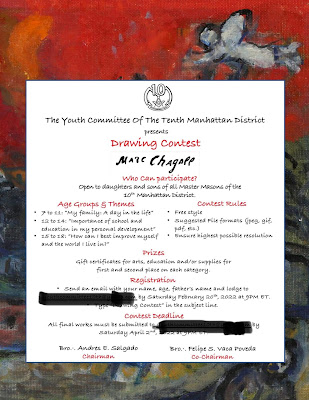 |
| Please pardon my sloppy cross-outs. |
Were this the work of any other District of Manhattan lodges, I would be shocked, but being as it comes from the Tenth Manhattan, I am approvingly delighted and want to report on it despite never having written here previously about any youth contest. But the Tenth Manhattan is a special grouping of lodges.
Well, we’re all special. The First Manhattan, for instance, has some of the oldest lodges in New York (and North America). The Fourth is home to lodges organized by profession. My lodge, Publicity 1000, for media people; St. Cecile 568 for show business entertainers; Kane 454 for intrepid Arctic explorers; et al. The Tenth Manhattan is comprised of foreign language and otherwise exotic and ethnic lodges: Garibaldi 542, l’Union Francaise 17, and eleven others of French, Greek, Italian, Sephardic, Spanish, et al. identities. “Cosmopolitan” is a word used, in certain contexts, to describe Freemasonry, and I’d employ it here.
So, we have a writing contest named for Hermann Hesse, and a drawing competition named after Marc Chagall!
Chagall (1887-1985) was a native of Russia who emigrated to France to pursue his destiny in the fine arts. He was made a Mason in Paris. Grand Orient, I think, but don’t quote me. (I like to imagine he, Juan Gris, and others were of the same lodge, but I have no idea.) Hesse (1877-1962), as far as I know, was not a Freemason. Of course, his interest was in Eastern thought, but the two are not mutually exclusive.
When I was Master of my earlier lodge in 2005, my final “From the East” message to the brethren was not something I wrote, but was a few excerpted sentences from The Journey to the East, Hesse’s post-World War I novella that every Freemason ought to know:
For our goal was not only the East, or rather the East was not only a country and something geographical, but it was the home and youth of the soul, it was everywhere and nowhere, it was the union of all times. Yet I was only aware of this for a moment, and therein lay the reason for my great happiness at that time. Later, when I had lost this happiness again, I clearly understood these connections without deriving the slightest benefit or comfort from them. When something precious and irretrievable is lost, we have the feeling of having awakened from a dream. In my case this feeling is strangely correct, for my happiness did indeed arise from the same secret as the happiness in dreams; it arose from the freedom to experience everything imaginable simultaneously, to exchange outward and inward easily, to move Time and Space about like scenes in a theatre. And as we League brothers travelled throughout the world without motorcars or ships, as we conquered the war-shattered world by our faith and transformed it into Paradise, we creatively brought the past, the future and the fictitious into the present moment.
It was from this story, which I first read at age fifteen, that I learned the master is a servant—wise counsel I’ve offered to many an advancing Senior Warden. I recall reading this book the first time I heard the Police’s “Wrapped Around Your Finger” on the radio. Serendipity, if you know the lyrics.

No comments:
Post a Comment